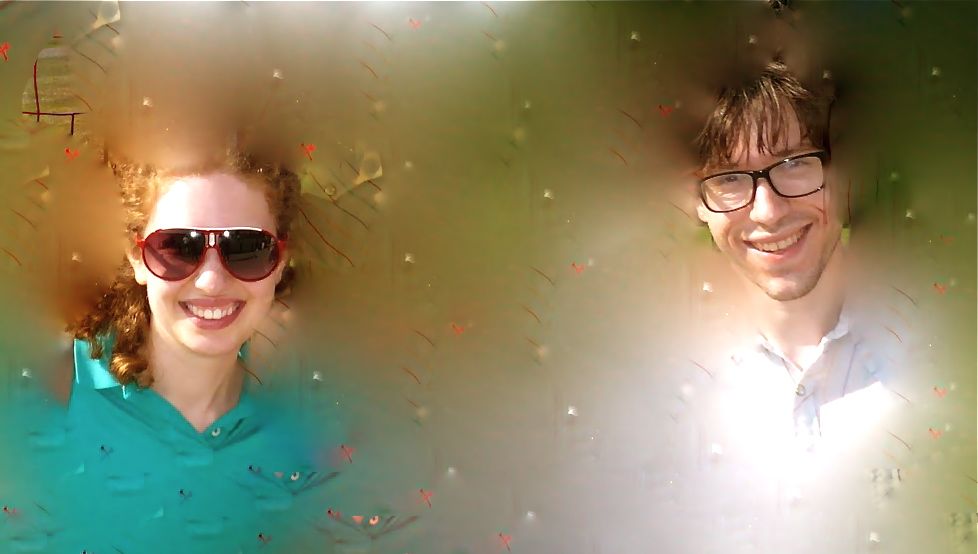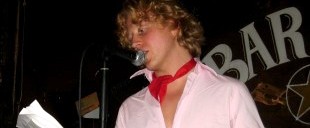Adam Robinson
http://www.publishinggenius.com
Adam Robinson lives in Baltimore, where he operates Publishing Genius Press. His book of poems, Adam Robison and other poems, will be published by Narrow House Books this year.
http://www.publishinggenius.com
Adam Robinson lives in Baltimore, where he operates Publishing Genius Press. His book of poems, Adam Robison and other poems, will be published by Narrow House Books this year.

Mike and Rachel met in 2007 in the popular Northampton hangout “Hugo’s.” They were both friends with the charismatic Chris Cheney and all three were enrolled in the Umass-Amherst MFA program. One year Rachel lived with Cheney and a bunch of troubled cats. Mike lived really far away. The next year Rachel lived with Mike in a clean looking apartment (like repainted recently and tastefully and blandly) that they kept pretty messy. Then Rachel moved to a big polluted fancy loft space and Mike stayed in his collapsed book palace. Then they got their books (Pee On Water and We Are All Good if They Try Hard Enough) published by Publishing Genius as part of Publishing Genius’s ‘platonic friends publishing plan.’
* * *
Rachel: Why didn’t we hang anything in our apartment?
Mike: hahaha i am not sure, i thought we did
we hung that poster behind the TV
i feel like there was at least one painting in our living room
Rachel: The ‘painting’ you are referring to, is this switch plate cover that my cousin made that was instead of a normal light switch cover.
Mike: ah yes!
that was it
Mike: hmm ok let me think of a question READ MORE >

Bill Knott will dedicate a book as you (yes, you) please.
Ryan Call and Christy Call’s 2008 story, Pocketfinger, at Everyday Genius.
NYTimes 100 Notable Books of 2010. I’m not on there. Are you?
What, a NOÖ Journal? Yep, great poems, great reviews, great stories and this WHAT WAIT A SECOND comic from John Dermot Woods (from which I clipped this roundup’s leading image).
 In her post about Barnes & Noble, Roxane Gay wrote a great introduction to this interview with Christopher Newgent about his Vouched project. She was walking around the store, saddened by the selection and (more importantly) the detachment from literature that the store promulgates. She wrote:
In her post about Barnes & Noble, Roxane Gay wrote a great introduction to this interview with Christopher Newgent about his Vouched project. She was walking around the store, saddened by the selection and (more importantly) the detachment from literature that the store promulgates. She wrote:
I walked around some more and thought about the Vouched Books project where Christopher Newgent brings his table of indie books and magazines he can vouch for to various literary/arts events around Indianapolis. There’s a lot to be said for bookselling on such a small scale. I’ve seen Christopher at work at a reading in Indy and he was never without interested people hanging around his table. People seemed really excited to be able to talk to someone about potential books and magazines worth buying and reading. One young man I saw was totally excited to learn about writers he had never heard of. I saw him walk away with like three books. As booksellers struggle with how to stay alive, I think part of the conversation should center around how we can make people feel connected to books.
That’s kind of like the dream scenario. And Christopher’s idea continues to grow. He runs a reading series, has a gang now, and as he announced in their new bi-monthly column at Small Doggies, they’re starting to run reviews (I think I have one forthcoming about that book Chris Higgs wrote). I’ve been excited about Vouched since Christopher first contacted me to order PG books. Before the project gets too big and leaves us all behind, I thought I’d throw some questions at literature’s newest Sam Walton. READ MORE >
You have to admit it’s pretty funny that you can get the NEW KEYHOLE journal (#10) for $8, or just $5 if “you think literary journals are boring or that reading in general is boring.”
 I mentioned the difficulty of reading Leslie Scalapino’s wordfall, The Dihedrons Gazelle-Dihedrals Zoom, to Lindsey Boldt, who published the book with Post Apollo Press. She responded generously, saying
I mentioned the difficulty of reading Leslie Scalapino’s wordfall, The Dihedrons Gazelle-Dihedrals Zoom, to Lindsey Boldt, who published the book with Post Apollo Press. She responded generously, saying
I agree that Scalapino’s work can feel very difficult, and this book I think feels especially daunting. Its prose is incredibly tangled and slippery to an almost maddening degree, which is what makes it so taxing but also so rewarding. I felt really anxious when I first sat down to read it and really fought to understand it on a sense-meaning level. I don’t think I’d faced such a literary challenge since college. I finally caved at some point and just let it turn into a sensory experience, which turned out to be really fun.
Certainly that’s an adequate and lovely review in itself, though it hardly matches the book’s blurbs: Fanny Howe calls it a “mystical vision” and Charles Bernstein said the book “is an ekphrastic implosion inside our severed human-body/animal-mind.” Talk about whoa! Michael McClure said the book comes from the “spagyric hinterlands of purest imagination,” and Etel Adnan called it our Divine Comedy but with “more humanity and more derision.”
So how is it that these syntactically dense word sets come to matter? READ MORE >

Along with the great discussion about how to read Andy Devine’s work in the LMC (which, really, is just cool), today at Electric Literature’s blog, Julia Jackson posts a write-up about Being Andy Devine, Andy’s tour across the states. Next stop, Solar Anus.

"Fhm" for Halloween as drawn by Tai Turner
This post is about the ad you’ve been seeing here lately.
And okay, full disclosure for the blog cops:
Recently, Justin Sirois and I and a couple other bros from way back lit up the Baltimore streets with a big plastic owl that Justin had kept buckled into his backseat for years. The owl was called BSO, as in, “Back Seat Owl.” We took the BSO to play pool at Club Phoenix. We took him dancing and everyone hooted when he did a backspin. We even bought him beers at H.L. Mencken’s old hangout, the Owl Bar. Then we took him to play football in the street where, sadly, the BSO perished.
Which is meant to confess two things: one, Justin is my friend. Two, my man knows party fowl. READ MORE >
is to listen to this song, every year since 1993.
This is from Bride’s third album. They are a Christian band from Kentucky.

“Do we want more civil talk than uncivil talk?” she asks. “Of course. But what we need to focus on is how both civility and incivility are structured, contained, and used… Even some incivility can move a policy debate along. Creating a culture of argument, and the thick skin that goes along with it, are long-term projects that will serve democracy well.”
Scott McLemee looks at Susan Herbst’s book Rude Democracy: Civility and Incivility in American Politics and comes away with a great justification for Mean Week (in case anyone needed one). Addressing the Jon Stewart rally thing, McLemee argues, “the anti-ideological spirit of the event is a dead end. The attitude that it’s better to stay cool and amused than to risk making arguments or expressing too much ardor — this is not civility. It’s timidity.”
I’ll always argue that it’s possible to disagree nicely, but I also liked the quote McLemee ended his article with, from T-Bone Slim: “Wherever you find injustice, the proper form of politeness is attack.” Impolite rhetoric has its place, why not. But in a comment box? Y’all’re morons.